Discover What Should You Not Feed Budgies: The basic rule of nutrition is that the budgerigar, like other living creatures, should receive the food that it finds in the wild. The basis of its diet is a mixture of various seeds. They can be supplemented with fresh fruits, vegetables, and minerals. And, of course, the parrot budgies not eat food from your table. Read further in the review for more information on what not to feed budgerigars.
What Should You Not Feed Budgies?
In short, You should avoid feeding your budgies any foods that contain a lot of sugar, such as candy and sugary drinks. High-sugar foods can cause health problems for budgies, like obesity and diabetes. You should also be wary of giving your budgie any foods that are too salty or acidic, as these can lead to digestive issues.
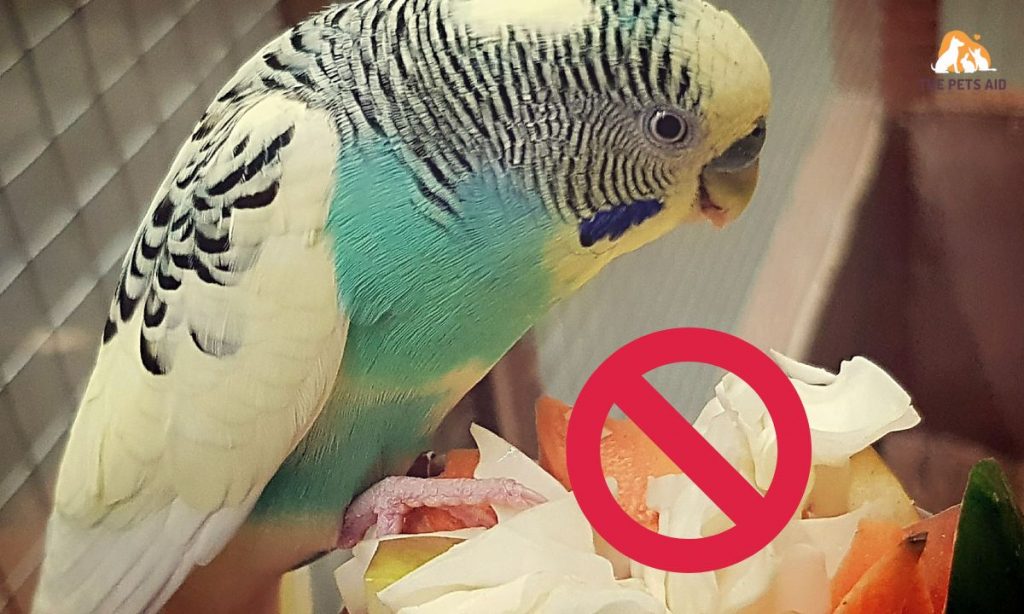
Furthermore, it’s important to keep in mind that certain foods may be toxic to budgies, such as avocado, chocolate 1Death by chocolate: a fatal problem for an inquisitive wild budgies. Source: pubmed.ncbi.nlm.nih.gov , and onions. Finally, wild birds often have access to different types of food than domesticated budgies do, so avoid offering your pet wild bird food.
Prohibited Products – What is Toxic to Budgies?
There are a number of potentially poisonous foods to be aware of. Heading this list is clearly dangerous:
- Avocados Avocado 2(Persea americana) intoxication in caged birds source. Source: pubmed.ncbi.nlm.nih.gov
- Tobacco
- Cane sugar
- Alcohol
- Caffeine
- Mushrooms
- Chocolate
- Tomato leaves and stems
- Uncooked beans
- Raw peanuts
- Curry powder
- Sage
- Walnut hulls
- Almonds
- Yucca
- Pits and seeds of many fruits, including apples and nectarines.
What Food Not to Give to Budgies? (8 Types)
There are also a number of products whose dangers could be clearer. Those that are on the list below, your budgies will eat with pleasure, but this does not mean that they are useful to him. And remember, don’t trust your pet’s judgment of what he wants to eat!
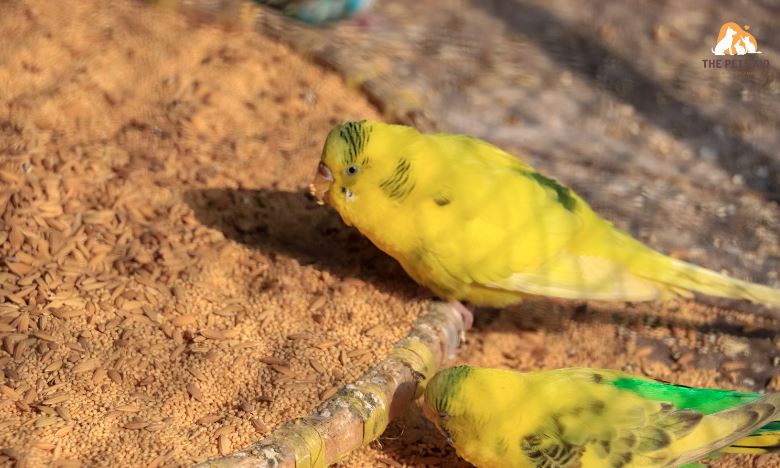
This group includes:
- Dairy products;
- Some vegetables and fruits;
- Fats;
- Salt and sugar;
- Meat;
- Pastries and Bread
- Seafood;
- Sweets and bakery products.
1. Dairy
If the bird drinks milk only once, her body will cope with the load. But they are not adapted to digest and assimilate lactose on an ongoing basis. Therefore, within 24 hours after drinking milk, they may experience loose stools.
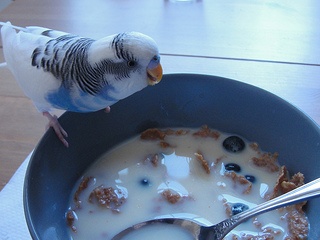
Don’t let this happen again. The only dairy product that is less dangerous is fermented yogurt.
It contains bacteria that are beneficial for the pbudgies’s stomach.
2. What Veggies and Fruits Budgies Can’t Eat
Citrus fruits, including lemon and lime, are high in citric acid. They are not poisonous, but citric acid will cause stomach upset. The toxicity of onions and garlic to dogs and cats is well known. In any form, these vegetables are also toxic to birds. All parts of the avocado plant contain persin 3Persin is a fungicidal toxin present in the avocado. Persin is an oil-soluble compound structurally similar to a fatty acid, and it leaches into the body of the fruit from the seeds. The relatively low concentrations of persin in the ripe pulp of the avocado fruit is generally considered harmless to humans. Wikipedia.
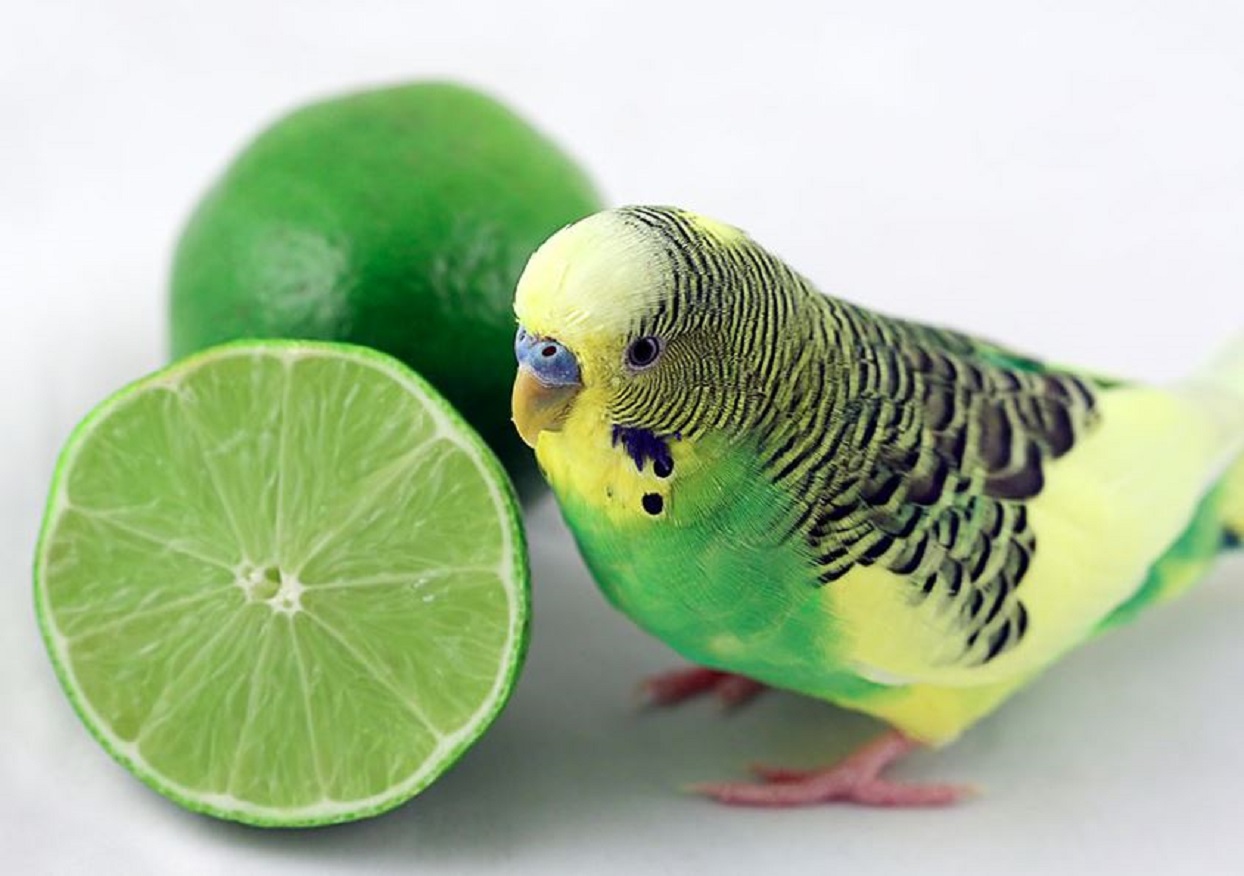
This substance affects the work of the heart of a feathered friend, and 12 hours after taking it, the budgies may feel short of breath and die from this toxin within 1-2 days.
Fruit pits are toxic enough to kill a budgerigar. Cherry, apricot, peach, apple, and pear pits are potentially lethal due to their cyanide content. Your pet doesn’t have a strong enough beak to split them, but if there are cracks in them, then the budgies will take advantage of this and get to the contents. So please don’t give him the bones.

What vegetables and fruits budgies can not eat:
- Green parts of eggplant, they contain vegetable poison;
- Beans – most of them are toxic to the budgies;
- Peanuts (it may contain a deadly fungus for a pet);
- Nutmeg;
- Green tomatoes (red – you can);
- Grapefruit;
- Lemon;
- Lime;
- Mushrooms;
- Garlic;
- Pear;
- Potatoes (raw);
- Garlic;
- Rhubarb
3. Fatty and Fried Items
Butter contains a lot of cholesterol. Therefore, it is not very suitable for a pet, but it is not poisonous either. Simply accumulating in the body, the decay products of the oil will cause obesity.
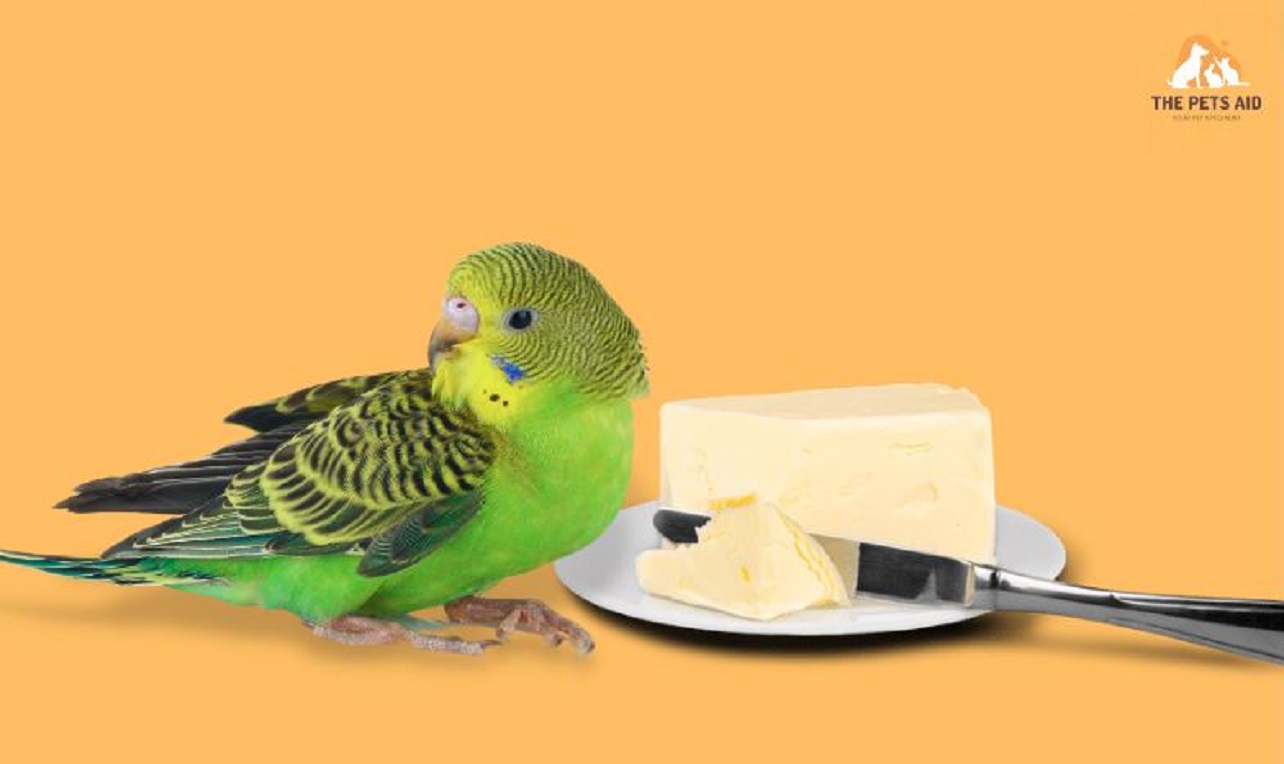
The problem is salt, which is necessarily present in the composition of any fat. This mineral is considered toxic and unsafe for most birds. As for fried foods, they do not exist in the natural environment. So don’t suggest them.
4. Salty and Sweet
Bird products contain salt, but it is sodium selenite. It is added to the diet to promote growth and prevent diseases associated with selenium deficiency. As for table salt that people consume, it is sodium chloride. And it’s toxic to birds.
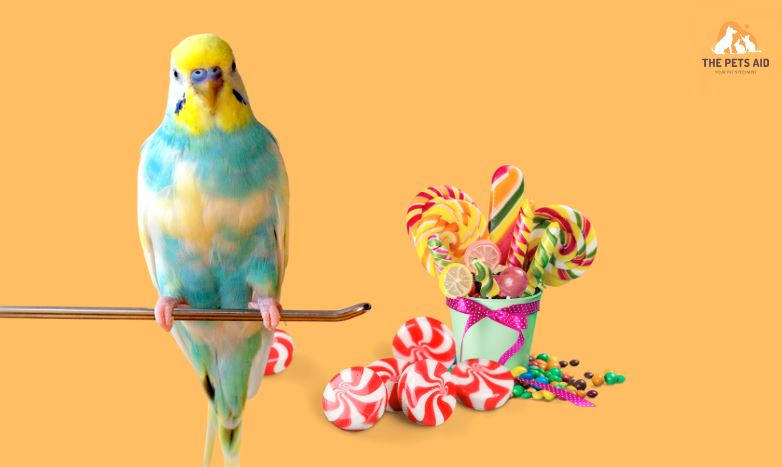
Their kidneys are unable to remove this compound from the body. As a result, dehydration will begin, and the bird will get sick and may die. Refined sugar is not healthy. This is a processed substance from which nutrients have been removed.
Accordingly, to process it, the body must isolate a number of reserved substances from its stores to process and remove the foreign product from itself. This puts the immune, endocrine, and digestive systems at risk.
If we were to use the budgies eye as a snapshot camera, it would take 150 images per second. Human eyes will take only 16 frames.
In large quantities, sugar can lead to diabetes, gout, heart disease, hyperreactivity, nervous disorders, feather loss, obesity, cancer, calcium/phosphorus imbalance, high cholesterol, depression, and irritability.
5. Meat and Fish Products
In the wild, budgerigars feed on insects. However, with a well-balanced diet in captivity, they do not require meat protein. Although sometimes the owners give meat to the birds.
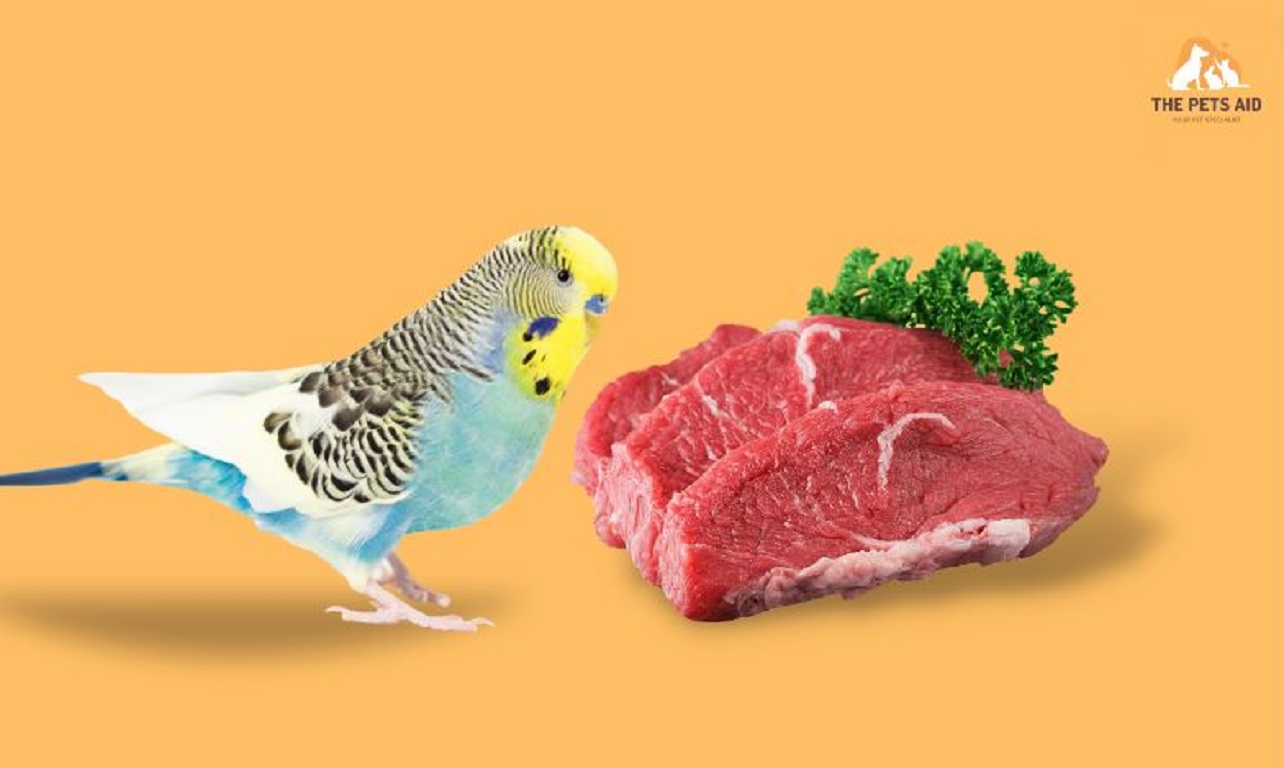
Do this only as an occasional meal. And it should be a quality product that is not fried or processed in any other way. Remember that the budgies liver is not always designed to deal with animal proteins. In addition, the use of antibiotics and hormones in artiodactyl rearing can adversely affect its health.
Seafood is an excellent source of protein and is low in fat, unlike meat. In principle, birds can eat fish. In moderation, it won’t hurt. But recently, experts have been talking about the deposition of mercury vapor in the tissues of fish as an element of industrial air pollution and do not recommend giving this product in large quantities, even if the budgerigar believes that this is the best dish on his table.
Did you know? Budgerigars can count up to three and store about 100 words in memory.
6. Pastries and Bread
Bread or toast is also an occasional treat in the diet. They contain salt, which can damage the kidneys. If you sometimes give wholemeal bread without adding salt, then the pet is fine, and he will crunch such a piece of bread with pleasure. Foods from the human diet, including cakes and chocolate, should not be given to a budgies.

Can budgies eat coffee? No, Coffee beans contain caffeine 4More than 57,000 birds in Costa Rica provides new insights into how coffee plantations affect tropical bird biodiversity. Source: NationalGeographic and other substances that can cause hyper-reactivity, increased heart rate, tremors, possibly seizures, and death in pets. And the darker the chocolate, the more toxic it is. Sugar-free candies may seem like the best alternative to regular sweets for people. But they contain the sweetener xylitol, which can cause severe hypoglycemia and liver damage.
7. Seafood
Mushrooms are sometimes included in lists of foods that are toxic to birds5Overview of Mushrooms Toxic to Animals. Source: Msdvetmanual. It must be remembered that not all of them grow in natural conditions for your pet. And those that he did not have in his homeland are not desirable in the diet.

We advise you to find out if roasted seeds can be parroted.
A budgies can eat seeds with a husk. But it does not contain substances useful for it, but it can lead to blockage of the intestines. Therefore, you need to take a closer look at how your pet eats such seeds. He should split the shell, but if this does not happen, then offer him the peeled ones.
8. Formulating a Diet
Poor nutrition is the most well-known source of most health problems. Therefore, striving to improve your budgie’s diet continually is important.
It must include the following:
- Wild herbs and leaves;
- Fresh seeds;
- Vegetable fruits.
Budgerigars consume the seeds both dry and germinated. They also eat leaves from eucalyptus trees, where they roost and nest. Seeds must be fresh as they have a limited shelf life. After this time, most of the nutrients will be gone. The same problem occurs if the seeds have been exposed to direct sunlight or heated.
To estimate the actual age of a batch of seeds, soak some of them in water for 6 hours, then drain the liquid and leave it on a piece of paper for 24 hours. After this time, 50% of the seeds should hatch; this proportion will be 100% in a good batch. If nothing happens, then these are bad seeds, and eating them will leave the pet underfed.
The most important of all seeds are cereals and herbs. They should make up 50% of the diet. This includes grains of wheat, barley, rye, oats, and wild herbs - ryegrass, bluegrass, meadow timothy grass, woolly buckthorn, hedgehog, bull grass, alfalfa, mustard, clover, dill.
Budgerigars love oilseeds. But they have the same meaning for them as chips in people's diets. Therefore, ensure sunflower seeds and other oilseeds are at least 5% of the daily diet.
Important! Flax seeds are not suitable for nutrition. Budgerigars do not like their slippery surface.
Conclusion
Use common sense when it comes to feeding your pet. Remember that any product in large quantities can become harmful. Therefore, it is absolutely impossible to use only a few products. The rest will not harm if occasionally eaten by your budgerigar.
Our Resources
- 1Death by chocolate: a fatal problem for an inquisitive wild budgies. Source: pubmed.ncbi.nlm.nih.gov
- 2(Persea americana) intoxication in caged birds source. Source: pubmed.ncbi.nlm.nih.gov
- 3Persin is a fungicidal toxin present in the avocado. Persin is an oil-soluble compound structurally similar to a fatty acid, and it leaches into the body of the fruit from the seeds. The relatively low concentrations of persin in the ripe pulp of the avocado fruit is generally considered harmless to humans. Wikipedia
- 4More than 57,000 birds in Costa Rica provides new insights into how coffee plantations affect tropical bird biodiversity. Source: NationalGeographic
- 5Overview of Mushrooms Toxic to Animals. Source: Msdvetmanual

